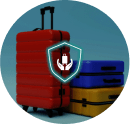Travel Insurance
Travel Insurance for Family with Policywings
Travel insurance for family is a must for safe and stress-free trips. Even risks can emerge in domestic travels, like medical emergencies, accidents, flight delays, or lost baggage that could significantly disrupt your plans and budget at the same time. Policywings offers simple as well as affordable plans, so that you can protect your entire family under one policy. You can enjoy your vacation knowing you’re covered against unexpected expenses. Travel smart, travel insured.
No matter if it’s a short weekend getaway or an entered holiday, when you go with travel insurance, it ensures peace of mind. Plus, it offers access to emergency assistance, cashless hospitalisation, as well as support services. You can secure each and every journey, making unforgettable memories without worrying about what-ifs.
Travel Insurance for Family: What is it and Why do You Need it?
1.Peace of Mind :
Travel Insurance for family refers to a policy that provides financial protection against unexpected events and mishaps during your travels. It covers a wide range of risks, including medical emergencies, trip cancellations, lost baggage, and more. But why exactly do you need travel insurance?
2.Medical Emergencies :
Illnesses and accidents can happen anywhere, even during your travels. Quality travel insurance ensures that you receive the necessary medical care without worrying about the expenses, especially if you’re traveling to a country with high healthcare costs.
3.Trip Cancellations and Interruptions :
Imagine saving up for a dream vacation only to have it canceled or cut short due to unforeseen events like natural disasters, illness, or other emergencies. Travel insurance can reimburse you for non-refundable expenses and help you reschedule or return home safely.
4.Lost or Delayed Baggage :
Misplaced or delayed baggage can be a hassle during your trip. Travel insurance can provide coverage for lost belongings, allowing you to replace essential items and continue enjoying your journey stress-free.
5.Personal Liability :
In unfortunate situations where you accidentally cause damage or injury to others, travel insurance can offer protection against legal expenses and liability claims.
6.Financial Protection :
Travel expenses can add up quickly, and unexpected events can lead to significant financial losses. Having travel insurance for family safeguards your investment by reimbursing non-refundable costs in case of cancellations, delays, or other covered incidents.
Types of Travel Insurance Policies
Travel insurance policies come in various forms, tailored to meet different travel needs. Let’s explore some common types:

This type of insurance reimburses you for prepaid and non-refundable expenses if you need to cancel your trip due to covered reasons, such as illness, injury, or a death in the family. It provides financial protection for flights, accommodations, and other prepaid costs.

Medical insurance covers the costs associated with unexpected illnesses, accidents, or medical emergencies that occur during your travels. It includes coverage for hospital stays, emergency medical care, doctor’s visits, medications, and sometimes even medical evacuation.

Baggage insurance protects against lost, stolen, or damaged baggage. It provides coverage for personal belongings, such as clothing, electronics, and other essential items. Some policies may also include compensation for delayed baggage.

Evacuation insurance covers the expenses of emergency medical evacuations, especially in remote areas where adequate medical facilities are unavailable. It ensures that you receive proper medical care and transportation to a suitable medical facility.
How to Choose the Right Travel Insurance for Family Policy
Selecting the right travel insurance policy requires careful consideration of your needs and preferences. Here are some factors to keep in mind when making your decision:
- Coverage : Review the coverage limits of different policies to ensure they meet your specific requirements. Consider the maximum coverage for medical expenses, trip cancellations, baggage losses, and other relevant aspects
- Exclusions and Limitations : Thoroughly read the policy documents to understand what is not covered and any limitations that may affect your claim eligibility. Common exclusions may include pre-existing medical conditions, extreme sports activities, or acts of war.
- Deductibles and Premiums : Evaluate the deductibles and premiums associated with each policy. A deductible is the amount you must pay before the insurance coverage kicks in, while premiums are the regular payments you make for the policy. Strike a balance between affordability and adequate coverage
- International Coverage : If you’re traveling internationally, ensure that the policy provides coverage in your desired destination. Check if there are any restrictions or limitations for specific countries.
- Additional Benefits : Consider any additional benefits or value-added services offered by the insurance provider, such as 24/7 emergency assistance, concierge services, or coverage for adventure activities.
- Provider Reputation and Customer Reviews : Whenever you consider having a travel insurance for family try to get insight on reputation and review. Research the insurance provider’s reputation and read customer reviews to gauge their reliability, customer service quality, and claims handling process. Choose a reputable provider with positive feedback from policyholders.
Latest Blogs
A Mediclaim insurance policy provides financial protection by covering hospitalization and treatment expenses during medical emergencies. With healthcare costs rising every year and lifestyle-related illnesses becoming more common, having a reliable mediclaim policy has become a practical necessity for individuals and families alike. It not only reduces the burden of unexpected expenses but also ensures access to quality care without any delay. From cashless hospitalization at network hospitals to tax benefits and optional add-ons, the benefits are many. In this blog, we’ll highlight the top reason why actually investing in a mediclaim policy today is essential in order to protect both your health and your finances. What is a Mediclaim Insurance Policy? A mediclaim insurance policy is a type of health insurance that actually helps you pay for hospital expenses during illness or even accidents. It covers costs, like hospital room charger, doctor’s fees, tests, along with medicines during hospitalization. The main difference from standard health insurance is that Mediclaim actually focuses on hospital-related expenses. However, there are different types of Mediclaim policies available: individual plans for one person, family floater plans that cover your whole family under one policy, group policies for employees, and special senior citizen plans for older adults who need extra care. Top Reasons to Buy a Mediclaim Insurance Policy Today It’s common that a Mediclaim insurance policy is a health cover. Over and above that, it’s your shield against rising medical costs along with life’s uncertainties. Here are the top reasons why investing in one today is a smart and necessary decision: 1. Rising Medical Costs Healthcare costs in India are increasing by 10-15% annually. From surgeries to medicines, everything is becoming expensive. A Mediclaim insurance policy helps protect you from this inflation as it covers major medical expenses and ensure you receive quality treatment without even financial stress. 2. Covers Hospitalization Expenses No matter if it’s an emergency, or even planned treatment, a Mediclaim insurance policy covers hospitalization expenses, like ICU charges, room rent, tests, along with doctor’s fees. This ensures that you, or even your family, don’t face financial hurdles while receiving care. 3. Financial Protection for the Entire Family It’s a policy that covers all family members under a single sum insured. It’s perfect for both families who are joint or not. It provides affordable health insurance and peace of mind, especially during unexpected medical emergencies. 4. Cashless Hospitalization Facility Many Mediclaim insurance policies offer cashless treatment at a wide network of hospitals. This implies that you don’t actually have to pay upfront; the insurer settles the bills directly, saving time while reducing stress during emergencies. 5. Tax Benefits Under Section 80D Premium paid towards your Mediclaim insurance policy qualifies for deductions under Section 80D of the Income Tax Act. You can also claim an additional deduction if you insure senior citizen parents. 6. Peace of Mind in Emergencies In critical health situations, having a Mediclaim insurance policy ensures you don’t have to borrow money or even dip into savings. It actually gives you confidence that you’re financially prepared for emergencies, so that you can focus entirely on treatment and recovery. 7. Coverage for Daycare and Pre/Post Hospitalization Most Mediclaim policies now cover daycare procedures that don’t actually need 24-hour admission, along with expenses incurred before and after hospitalization. This ensures end-to-end care without worrying about multiple bills. 8. Protection Against Lifestyle Diseases With more people being diagnosed with diabetes, heart conditions, along with high blood pressure, a Mediclaim insurance policy becomes essential. It actually helps manage long-term treatment expenses, especially for lifestyle-related health issues. 9. Additional Benefits & Add-Ons You can enhance your Mediclaim insurance policy with add-ons like critical illness cover, maternity benefits, OPD cover, along with wellness programs. These extras make the policy more customized and suitable for your health needs. Who Should Consider a Mediclaim Policy? Mediclaim insurance is a crucial part for everyone, but certain groups benefit even more due to their unique health or financial needs. Here’s who should strongly consider getting one: Young professionals starting careers: If you’re a young professional and starting your career, early Mediclaim purchases always ensure long-term coverage, lower premiums, along with financial security against sudden healthcare expenses from the beginning. Families with children: Family floater Mediclaim plans cover all members, and offer affordable protection as well as easy claims during emergencies, especially for growing kids. Seniors with rising health risks: Senior citizens face frequent health concerns; a Mediclaim policy provides financial help for treatments and hospital stays when needed. People with existing health conditions or family medical history: Those with known medical risks should get covered early to avoid large treatment costs and meet future healthcare needs easily. Tips to Choose the Right Mediclaim Insurance Policy When it comes to choosing the right Mediclaim insurance policy, it needs careful comparison is needed. Here are some of the key tips in order to help you make smart decisions: Always choose a policy with a wide hospital network along with cashless treatment in order to ensure smooth access during emergencies, or even planned care. Compare premium costs with sum insured to ensure maximum coverage without overspending on your annual health insurance budget. Carefully read inclusions, exclusions as well as waiting periods so that you understand what’s covered and avoid surprise at claim time. Check the insurer’s claim settlement ratio; it actually reflects their reliability and how efficiently they handle and settle claims. Conclusion So, when it comes to Mediclaim insurance policy, it truly offers support when medical needs arise, whether it’s a sudden emergency, or even planned care. It’s all about being prepared, not actually panicked. With so many plans available, choosing the best and right one matters a lot. That’s where Policywings helps. Policywings offers clarity, comparison options, aling with expert guidance every step of the way. Now, you just need to explore your
...You can protect yourself in the event that something goes wrong while you’re traveling by getting a travel insurance plan. Medical crises, misplaced luggage trip cancellations and delays are all covered. Having the appropriate travel insurance plan provides you with peace of mind whether you are taking a short weekend getaway business trip or vacation. It ensures that you don’t suffer significant financial losses in the event of unforeseen issues. Because every trip is unique, it’s critical to select a plan that works for you. We will explain how to choose the best travel insurance for any type of trip in this guide. Know What Travel Insurance Typically Covers Medical emergencies and hospitalization Travel insurance plan online assists in covering medical bills or hospital stays in the event that you become ill or are hurt while traveling. It can pay for tests, medications operations and even ambulance fees. If you’re going to a place where healthcare is expensive or unknown this is crucial. Trip cancellations or delays Your pre-paid expenses may be refunded by your travel insurance if you have to cancel your trip for any major reason such as illness or an accident. In the event that your flight is delayed or you miss a connection it also helps by paying for additional hotel stays, meals and other urgent costs while you wait. Lost luggage and personal belongings A travel insurance plan online can assist you in purchasing necessities like clothing or toiletries in the event that your luggage is delayed, lost or stolen. Depending on the restrictions and terms of your plan it might also pay for the replacement of valuables like your passport electronics or travel documents. Accidental death or dismemberment If you pass away in an accident while traveling this portion of the policy provides your family with financial support. In addition you might receive a lump sum payment if you sustain a serious injury, lose a limb or lose your sight. For the worst it serves as a safety net. Emergency evacuation and repatriation This coverage is useful in the event of a natural disaster, political upheaval or medical emergency that requires you to be transported to a safer location or returned to your nation of origin. It ensures your safe return by covering the cost of transportation whether it be by air ambulance or a special flight. Consider Add-On Coverage Options Depending on your needs, basic travel insurance might not always be sufficient. Add-on coverage options come in handy at that point. Depending on your activities, health or possessions you can add these additional protections to your plan. Coverage of adventure sports. Regular insurance might not cover injuries from sports like trekking, scuba diving or skiing if you intend to engage in these activities. Coverage for adventure sports protects you while engaging in high-risk activities and covers medical expenses in the event of an injury. Protection against COVID-19. This add-on covers COVID-19-related expenses including testing treatment quarantine and even trip cancellations in the event that you or a family member test positive. When traveling abroad where regulations can change at any time its extremely helpful. Protection against pre-existing medical conditions. Treatment for pre-existing conditions such as diabetes or heart problems can be covered while traveling with this option. Claims for such conditions could be denied without it. Coverage for rental cars electronics etc. If you misplace or break your phone laptop or camera this add-on can help. It also includes coverage for rental car damage. This is a wise addition if you’re renting a car or carrying bulky equipment. Compare Plans from Different Insurers Comparing plans from various companies is a wise move before purchasing a travel insurance plan online. This enables you to locate the best coverage at a reasonable cost. Make use of comparative websites or applications:– Compare travel insurance plans quickly by using reputable websites or apps. By displaying costs, features and advantages side by side they help you save time and effort. Examine the premiums exclusions and coverage limits:- Examine the premium (cost) the coverage amount and the exclusions on each plan. A low-cost plan might overlook crucial safeguards. Examine client feedback and claim settlement percentages:– See what other customers have to say about the business’s services. Check the company’s claim approval rate as well:- You have a better chance of receiving your money back when you need it if the claim settlement ratio is higher. Check Policy Exclusions and Limitations Always read the exclusions from a travel insurance plan online before purchasing one. This keeps you from being caught off guard when you make a claim later. Activities that are not covered:- Risky sports like skydiving, scuba diving and mountain climbing are often excluded from insurance plans. You might require specialized add-on coverage if you intend to participate in adventure sports. Pre-existing conditions:- Treatment for pre-existing conditions like diabetes or asthma is typically not covered by basic plans. For these circumstances you might need to purchase additional coverage. Specific countries or regions not covered:- Certain nations or regions might not be covered by the policy particularly if there are travel advisories about war or hazardous conditions. Always confirm that the coverage includes the place you are going. Understand the Claims Process In the event that something goes wrong while you are traveling it is crucial to know how to submit a claim. Here’s what you should remember. Documents are needed. Keep all tickets, reports, invoices and receipts secure. They must provide documentation of your loss such as police reports for misplaced property or medical bills. The period within which claims must be filed. After the incident you have a set period of time (usually 7 to 30 days) to submit your claim to the majority of insurance companies. On-time submission is crucial. Contact details for emergency situations. Never forget the insurer’s emergency number or helpline. In the event of a medical emergency or other pressing circumstance give them
...Let’s face it—we have all been there. That sinking feeling when a great employee walks into your office and says, “I’m putting in my notice.” It stings, does not it? Especially when it’s someone you have trained, someone who knows your systems inside out, someone who brought real value. We have experienced that exact moment more than once. And like you, we have asked ourselves—what more could we have done? See, the workplace has changed. People no longer stick around just for a paycheck. What they want is something deeper—security, empathy and a real sense that their employer values them not just as workers, but as people. That’s when we realized how critical Group Health Insurance is when it comes to keeping our team loyal, satisfied and motivated. You may be thinking, “Health insurance? Is not that just a checkbox benefit?” Not quite. Stick with us here, because once we truly understood how group health insurance works—not just as a policy but as a strategy—employee retention became so much easier. Cool, right? Let’s explore why this benefit has become our secret weapon in retaining our best people—and how it can work for you too. Understanding Why Group Health Insurance Makes Employees Stay There’s a reason why we’re passionate about this. Health insurance is not just about hospital bills. It’s about peace of mind. We learned this the hard way when one of our own team members had a sudden medical emergency. Before we introduced our group health plan, they had to struggle with paperwork, partial coverage and massive out-of-pocket expenses. We felt terrible. And honestly? That was the wake-up call. We needed to step up as employers. When we finally rolled out a comprehensive group health plan, it completely changed how our employees felt about being part of our organization. It was not just about ticking the HR checklist anymore. It was about giving our team members the assurance that we have got them covered. From pre-existing conditions to maternity care to mental wellness, our group insurance plan offered everything under one roof. It surprised us how quickly this shifted the mood across the team. People who were quietly worrying about family health expenses or skipping doctor visits now felt secure. Their loyalty? It skyrocketed. And the bonus? Our reputation as an employer got a solid boost. Let’s Talk About What’s Inside These Plans—and Why They Matter When we say group health insurance is powerful, it’s because of the features it brings to the table. We’re not talking about basic hospitalization cover here. We are talking about real, comprehensive care that employees actually use and value. One of the first things that stood out to us was that there’s usually no waiting period for pre-existing illnesses in a group plan. That’s huge. In personal insurance policies, employees often wait years before their diabetes, hypertension, or thyroid issues are covered. But with our group policy, the coverage kicked in from day one. That kind of instant support? It’s priceless when you are trying to win trust. We also loved the fact that our employees could add their spouse, kids and even parents under the same plan. That’s right—parents too! And when we announced this? Some of our team members literally sighed in relief. Covering aging parents is one of the most stressful parts of adulting and we were now making their lives easier. And then there’s the cashless hospital network. Across major cities and even in tier-2 locations, our employees could walk into a hospital, show their e-card and receive treatment without having to pay upfront. No messy reimbursements. No time wasted in chasing paperwork. Just seamless care when they needed it most. One of our employees even told us how their child had to be hospitalized suddenly, and thanks to the group insurance, the entire treatment was taken care of. No debt. No worry. Just gratitude. That kind of moment builds emotional loyalty far beyond what a bonus ever could. Also Read: Group Health Insurance vs. Individual Plans It’s Not Just Physical Health—Mental Wellness Is Covered Too This one’s close to our hearts. We noticed over time that some employees were silently burning out. And with all the pressures of post-pandemic work life, mental health had become a topic we could not ignore. That’s when we were pleasantly surprised to see that many modern group insurance plans include mental wellness support—like online therapy, counselling sessions and even stress management workshops. We made sure this was part of our offering. And it helped us open conversations that were previously considered “too personal” for the workplace. You know what happened next? Trust deepened. Team members started engaging more, productivity went up, and the overall vibe at work got warmer, more human. We didn’t just say, “We care about your well-being.” We proved it—with policies that actually support well-being. Affordability Makes It a Win-Win Now, you might be wondering—this all sounds great, but what about the cost? That’s what we asked at first, too. But here’s the thing: group health insurance is surprisingly affordable. Since the risk is spread across a group of people, premiums are significantly lower than individual policies. For us, offering a ₹5 lakh sum insured for each employee and their family cost way less than we expected—around ₹800 to ₹1,200 per month per employee. That’s less than what we spend on a weekend team dinner! And here’s what makes it even better—we had the option to customize the policy. We could choose add-ons, raise the cover, or extend benefits depending on our team’s unique needs. The flexibility was amazing. It didn’t feel like a one-size-fits-all solution. It felt like something we designed for our people. And let’s not forget tax benefits. As employers, the premiums we pay are tax-deductible. So while we’re taking care of our employees, we’re also saving money. Double win. What We Noticed After Implementation Once our group health plan was up and running, we
...Let’s start with something real. We have all had that moment—maybe while putting our child to bed or glancing at our partner across the dinner table—when a thought creeps in: What would happen to them if I was not around anymore? It’s uncomfortable, even a little scary, but it’s honest. We are not just thinking about ourselves anymore. We have got a family to protect and with that comes the responsibility of preparing for the unexpected. We have been there—googling “term insurance vs. whole life insurance,” trying to decode the jargon, and feeling more confused than when we started. So let’s break it all down, together. Let’s make sense of this—because making the right choice between term and whole life insurance is not just about money. Why Life Insurance Even Matters for Families Before we jump into term vs. whole life, let’s talk about why life insurance matters so much when we have a family. It’s not about expecting the worst—it’s about being prepared for it. If something were to happen to us, we want to know that our kids can still go to school, our home stays safe and our partner does not have to shoulder every financial burden alone. According to IRDAI, only around 3% of India’s population has adequate life insurance coverage. That’s scary. Many of us are underinsured simply because we did not understand our options. But the good news? We can change that right now. Let’s Understand Term Life Insurance First So what is term life insurance really? In simple terms, it’s a plan that covers us for a specific period—10, 20, maybe even 30 years. If something happens to us during that time, our family receives a lump sum payout called the death benefit. If we outlive the term, there’s no payout. Sounds straightforward, right? We love term insurance because it’s affordable and high-coverage. For example, a 30-year-old non-smoker in India can get ₹1 crore coverage for less than ₹800/month. That’s powerful financial protection at the cost of a couple of pizzas. What happens after the term ends? Say we are now in our 60s, the term has ended and we are no longer covered. If we still have dependents or debts, that’s a potential issue. That’s when we start wondering—Should we have gone with whole life insurance instead? Now Understand Whole Life Insurance Now, whole life insurance—that’s the more permanent kind. Unlike term plans, whole life covers us for our entire lifetime. As long as we keep paying premiums, the policy stays active and our family gets the payout whenever we pass away—whether that’s 20 or 60 years from now. But wait, there’s more. Whole life plans also include something we love: cash value accumulation. A portion of our premium builds up like a savings fund. Over time, we can borrow against it, withdraw from it, or even use it to pay premiums. It’s like insurance plus investment. Of course, it’s pricier. That same ₹1 crore coverage might cost ₹8,000–₹10,000/month. But in return, we get a guaranteed death benefit, lifelong coverage and a built-in savings cushion that grows over time. It’s a real asset. We have met families who used the cash value to pay for college tuition, fund a business or deal with emergencies. That kind of flexibility can be a game-changer when life throws a curveball. So Which One Do We Really Need? Let’s think through our own situation. If we are young, have a limited budget and our primary goal is protecting our family during our prime working years, term insurance is a fantastic choice. Since real estate is reasonably priced and provides excellent safety, we may concentrate on other financial objectives like investment or home ownership. However, if we are making plans and want a lifetime safety net, whole life insurance would be a better option. We could leave a legacy or make sure our kids inherit something safe.. It’s like planting a financial tree that will keep producing no matter what stage of life we’re in. We were genuinely moved by this story. One of our acquaintances in his 30s bought a term plan because he thought it was all he needed. But at 65, with a dependent spouse and no coverage left, he was stuck trying to get a policy again—only now, with age and health issues, premiums were through the roof. That’s when we realized: it’s not just about choosing what works now but what we will wish we had 30 years later. What Are Other Families Doing? Let’s look at some trends. According to a 2023 survey by Max Life, over 65% of Indian families prefer term insurance as a starter option because of affordability. But among those over 40, there’s a growing shift toward whole life or endowment plans for their dual benefit of savings and security. It’s not a one-size-fits-all decision. Some families even combine both—using term plans early in life and gradually adding whole life or ULIP-based plans as their income grows. That hybrid strategy can work wonders. Final Thoughts: What Should We Choose? So here we are, back at the fork in the road: term or whole life? We have walked through the pain points, the features, the stats, the real stories—and here’s what it comes down to. If we are looking for affordable, focused protection for a specific time frame, term insurance has our back. If we want lifelong assurance, wealth building and flexibility, whole life steps in as the hero. The right choice? It depends on where we are in life, what our goals are and how we want to leave our mark. But one thing’s for sure—doing nothing is not an option. Because if we truly love our family, we owe it to them to be prepared. That’s why choosing the right life insurance for family matters. So let’s sit down, take a deep breath, maybe even talk to a financial advisor—and make the
...Let’s be honest: Managing auto insurance may be somewhat difficult. Everybody has been there, sifting through countless policy possibilities to determine what is worthwhile and what is a waste of money. With all those cryptic phrases, insurance firms can occasionally seem to be speaking a foreign language. Furthermore, with so many other costs associated with the car, who wants to shell out a fortune for insurance? We search for the lowest auto insurance since we want to be protected without going over budget. But here’s the million-dollar question: does cheapest always mean safe? Or are we just setting ourselves up for trouble down the road? This is something many of us wonder. Why Are We Chasing the Cheapest Car Insurance? We know car expenses add up fast — fuel, maintenance, parking, tolls and then insurance premiums. The question, “Why pay more when I can get something cheaper and still be legal?” is naturally raised. While we want to save money, we also want to be safe. Therefore, it is tempting to get the cheapest insurance, but there is a catch. Completeness does not necessarily equate to lowest cost. So let’s break down what we’re really getting when we pick the cheapest option. The Basics: What Does Cheapest Car Insurance Usually Cover? When we say “cheapest car insurance,” most of the time we are talking about Third-Party Liability Insurance. This is the bare minimum required by law in many countries, including here. Think of it as the legal ticket to drive your car without breaking the rules. What’s Covered in Third-Party Insurance? Basically, this insurance protects us against damages or injuries we cause to others. For example, if we accidentally scratch someone else’s car or cause an accident that injures another person, this insurance steps in to cover those costs. That means it pays for the repairs or medical bills of the third party. One cool thing about third-party insurance is that it usually comes with very low premiums. On average, in India, we might pay around ₹2,000 to ₹3,000 per year for a small car. That’s super affordable compared to other plans. But here’s the kicker — it does not cover our own car damage or our injuries. So if we crash our car or it gets stolen, we are on our own. It’s like having an umbrella that only covers other people standing near us but not ourselves. Risky, isn’t it? What’s NOT Covered by Third-Party Insurance? So, while it covers legal liabilities to others, it leaves out everything else. No coverage for our own car’s damage from accidents, theft, fire or natural disasters. No personal accident cover for us as drivers (or very limited). If our car gets vandalized, the insurance would not pay us a dime. We have all heard stories of someone who went cheap, got into a bad accident, and then was stuck paying thousands out of pocket. That’s the danger. So while this insurance is the cheapest, it comes with big gaps. The Next Step: Comprehensive Insurance — What Makes It Different? If we want real peace of mind, we look at comprehensive insurance. This is like upgrading from a basic phone to a smartphone — yes, it costs more but we get a lot more features and protection. What Does Comprehensive Insurance Cover? First, it covers everything the third-party insurance does — legal protection against damages or injury to others. But on top of that, it covers our own car too. That means if our car is damaged in an accident, stolen, catches fire or is hit by floods or other natural disasters, this insurance has our back. Another awesome feature is personal accident coverage for us, the driver. If we get injured or worse in a car accident, the policy pays a lump sum to us or our family. That’s a huge relief to have. Also, many comprehensive policies let us add extra protection options — called “add-ons” or “riders.” For example, zero depreciation cover means when we claim for parts replacement, the insurer would not deduct depreciation costs, so we get full repair costs. Then there’s engine and gearbox protection, roadside assistance and even return to invoice cover, which means if our car is totaled, we get the original invoice value, not just the current market value. How Much Does Comprehensive Insurance Cost? Yes, it’s pricier — typically ₹6,000 to ₹20,000 or more per year depending on the car and location. But here’s the thing — many of us feel it’s worth it because the financial protection is much broader. Also, with so many add-ons, we can customize the plan to fit our budget and needs. According to recent data, about 60% of car owners in India now prefer comprehensive plans over third-party, mainly for the added security. But What About Those Extra Costs? Are Add-Ons Worth It? Good question! When we pick cheapest insurance, we usually avoid add-ons to keep costs down. But some add-ons can actually save us money in the long run. Take zero depreciation cover again. Normally, if our car’s parts depreciate over time, the insurer deducts that from the claim amount. So, if a part costs ₹10,000 but depreciates by 50%, we get only ₹5,000. With zero depreciation, we get the full ₹10,000. Cool, right? It might add some premium to our policy, but it prevents big out-of-pocket expenses later. Then there’s roadside assistance — invaluable when we are stranded with a flat tire or a dead battery. Instead of paying a tow truck huge fees, the insurance provider sends help quickly. Engine protection cover is another lifesaver if our engine or gearbox fails due to water ingress or oil leaks — things not covered in standard policies. So, while add-ons increase the premium a bit, they can protect us from unexpected shocks. What Happens When We Choose the Cheapest Option — Real-Life Examples Let me share
...Have you ever been midway through a family vacation plan—bags packed, itineraries ready—when a sudden illness, flight cancellation or lost baggage throws everything off track? We have been there. Planning a family trip is exciting but it also comes with its fair share of unexpected moments. That’s why having the right travel insurance for family is not just smart—it’s essential. We are not just talking about protection; we are talking about peace of mind for everyone traveling together. And trust us, once you understand what’s included (and what’s not), you will never leave home without it again. So, let’s see what this type of insurance actually offers, and how it protects us—our children, our spouse and even our parents if they are tagging along. Why Family Travel Insurance Matters When we travel solo, it’s easy to take a few risks. But with family? We need to be extra careful. From minor issues like a misplaced passport to major concerns like a medical emergency abroad, things can spiral quickly. Take this for instance—did you know that over 40% of Indian travellers have faced medical or logistical issues abroad but only around 10% actually buy travel insurance before heading out? Surprising, right? And we have seen it ourselves—one of our friends had to cut short their trip to Europe because their son had a severe allergic reaction. The medical bill? Over ₹3.5 lakhs. But because they had comprehensive family travel insurance, it was fully covered. That’s the kind of safety net we all need when we are travelling with loved ones. What’s Included in Family Travel Insurance? Now, let’s break down what we do get when we opt for travel insurance for family. And not just in plain terms—we are talking real, valuable benefits. Emergency Medical Coverage This is the heart of any travel insurance policy. If any of us fall sick or meet with an accident during our trip, this feature ensures we do not burn through our savings. The best part? Family plans cover everyone under one umbrella—parents, spouse and children. Most policies cover hospitalisation, outpatient treatments, emergency medical evacuation (if needed) and even repatriation. Some even offer cashless treatment, so we do not need to run around arranging money in a crisis. Example? We had a relative who slipped in a hotel bathroom in Singapore and broke her wrist. Their insurer covered her surgery, medication and hotel stay extension. We do not realise how helpful this is until we are actually in that situation. Trip Cancellation or Curtailment Life can throw surprises. What if one of us has a family emergency or a visa gets rejected just before departure? Trip cancellation insurance is useful in this situation. It covers non-refundable costs such as hotel reservations and airline tickets. A lot of insurance also covers trip interruption, so we can still get reimbursed for some of our expenses if we have to stop the trip in the middle for personal or medical reasons. Pro tip: Always confirm that cancellations due to COVID-19 are covered. There are now particular provisions for pandemic-related disruptions in many insurance policies. Passport or Baggage Loss We have all been there, have not we? Missing passports, delayed baggage delivery, or lost bags? It may seem insignificant, yet these situations can turn into nightmares when we are around children or aging parents. Good travel insurance will reimburse us for baggage delay (so we can buy essentials), cover lost belongings and assist in getting emergency documentation if passports are lost. Some plans even offer a dedicated 24×7 helpline for such emergencies. That’s a huge relief when we’re in a foreign land. Personal Liability Cover This one’s often overlooked but incredibly valuable. Say our child accidentally damages hotel property or we are involved in an accidental injury to someone abroad—travel insurance steps in to cover legal liabilities and expenses. While we hope nothing like this ever happens, it’s great knowing we are protected just in case. Compassionate Visit and Family Travel Assistance Some family plans even allow a close relative to fly in and be with us in case of hospitalisation for an extended period. Cool right? These small gestures make a big difference when we’re dealing with tough situations far from home. What’s Not Included in Family Travel Insurance? Alright, now that we have looked at the good stuff, let’s not skip what is not covered. Understanding the exclusions is just as important—because it helps us avoid surprises later. Pre-Existing Medical Conditions Most family travel insurance plans do not cover medical issues we already had before the trip, unless declared and accepted by the insurer. So if someone in our family has diabetes or heart conditions, we need to discuss this with the insurer and opt for a plan that includes it. Adventure Sports and High-Risk Activities Planning to go skydiving or scuba diving with the kids? Regular plans would not cover accidents from such activities. We’ll need to purchase an add-on or opt for a plan specifically tailored for adventure travel. Alcohol or Drug-Related Incidents If an accident occurs under the influence of alcohol or drugs, it’s not covered. So if we are enjoying a glass of wine on the beach, let’s make sure we stay safe and responsible. Self-Inflicted Injuries or Mental Health Issues Most plans do not cover self-inflicted injuries or mental health treatments abroad. Some newer policies are changing this, but it’s still rare in India. It’s worth reading the fine print if we’re traveling with anyone dealing with mental health concerns. Features We Should Look For When Choosing a Plan Let’s pause for a moment. With so many policies out there, how do we pick the right one? We have learned (sometimes the hard way) that it’s not just about the price. It’s about features. So when we are choosing travel insurance for family, here’s what
...Let’s be honest — choosing a senior citizen health insurance plan can be stressful, right? We have all had those moments where we are sitting in front of a screen, reading about different policies and just feeling overwhelmed. So many terms, so many conditions and on top of that all the myths floating around that make everything sound scarier than it actually is. We remember when we first started researching insurance plans for senior citizens for our parents. We were hit with statements like, “It’s too late now,” or “These policies don’t really help.” That fear? It’s real. But here’s what we discovered — most of those so-called “facts” are actually just myths that need to be cleared up. So today, let’s sit down together and talk about these common myths. Let’s bust them, one by one and figure out what’s true and what’s not. Myth 1: Senior citizen health insurance is too expensive and not worth the cost This is one of the most common myths we come across. It sounds logical at first — premiums are higher for older people, so it must not be worth it, right? But that’s only looking at one part of the story. Yes, premiums for senior citizens are slightly higher, but they are designed to provide tailored benefits for people who may already have existing health conditions or require specialized care. What we need to focus on is the coverage offered — from hospitalization, pre- and post-hospitalization care, ambulance charges and in many cases, day-care procedures. Many plans also offer lifetime renewability, coverage up to several lakhs and the inclusion of domiciliary hospitalization. What we are really paying for here is financial protection. One single hospitalization could drain our savings — but a well-chosen policy ensures we would not have to make that tough call between health and money. When we look at it from this lens, it’s not a burden — it’s an investment in peace of mind. Myth 2: Pre-existing conditions are never covered We have all worried about this. What happens if our parents already have diabetes or heart conditions? Does that mean they are automatically disqualified? Not at all. Most senior citizen health insurance plans do cover pre-existing conditions — they just come with a waiting period. This period varies from policy to policy, often ranging from one to four years. Once that period is completed, the conditions are fully covered under the policy. It’s all clearly mentioned in the documentation — no hidden surprises if we take time to understand the terms. Besides, many policies include features like annual health checkups, wellness benefits and chronic care support. These are not just add-ons — they are part of a thoughtful approach to managing the specific health needs of senior citizens. So if we are thinking that pre-existing conditions make insurance pointless — it’s time we change that mindset. Myth 3: All health insurance policies are basically the same Let’s admit — it’s tempting to just pick the first policy that comes up in a search result and be done with it. But here’s the truth — no two health insurance policies are the same. And when we are talking about senior citizens, the differences can be huge. Each plan comes with its own structure — the sum insured, the co-payment percentage, hospital room rent limits, post-hospitalization benefits, claim process and more. Some policies also offer restoration of the sum insured, which means if the entire amount is used up during the year, it gets replenished for further use. That’s a pretty handy feature, especially when we consider multiple hospital visits in a year. When we compare wisely, we give ourselves the chance to pick a plan that aligns perfectly with our needs. This is about choosing safety, not settling for average. Myth 4: Cashless treatment is not available for senior citizens We have heard this concern more times than we can count: “we will have to pay everything upfront and claim later.” But that’s not the case anymore. Most insurers now offer cashless treatment facilities through large networks of hospitals. This means if our loved one is admitted to a network hospital, the bill can be settled directly between the insurer and the hospital. We would not have to run around arranging cash during emergencies, which — let’s be honest — is when we need the most support. It’s also worth noting that these plans usually cover both pre- and post-hospitalization expenses, sometimes up to 60 or even 90 days, depending on the insurer. That means doctor visits, diagnostics and medicines before and after the hospitalization are also covered — reducing the financial pressure on the family. Myth 5: Co-payment makes insurance useless Co-payment is one of those words that instantly makes us nervous. It basically means we need to bear a certain percentage of the claim amount — usually 10% to 30%. At first glance, that sounds like a dealbreaker. But let’s look at it from another angle. Co-payment exists because, in higher-risk age groups, insurers share the treatment costs with policyholders. It’s how they manage risk while still offering comprehensive cover. And here’s the part many of us don’t know — some policies allow us to reduce or remove co-payments by paying a slightly higher premium. Also, even with a co-payment clause, the bulk of the medical expenses — including hospital stay, surgeries, diagnostic tests, and medicines — are still covered. We are not left alone. So the myth that co-payment makes a policy useless? Not true at all. Myth 6: Buying health insurance for seniors is complicated and time-consuming We used to believe this one too — that buying insurance means tons of paperwork, medical checkups, and days of waiting. But things are a lot simpler now. Most insurers offer digital enrollment, minimal documentation, and even doorstep medicals where needed. The customer support teams guide us through each step, from choosing the
...Let’s get real for a moment—have we ever sat down and asked ourselves, what would happen to our loved ones if we were not around tomorrow? It’s one of those tough, uncomfortable questions that we tend to push aside, thinking we have got time. We get it—life’s busy and we have got responsibilities, bills, goals, maybe even that long-awaited vacation planned. But deep down, we know we can not leave our family’s future hanging by a thread. We have all heard stories—some close to home, some on the news—about families who had to face both emotional loss and financial instability at the same time. That’s exactly why term insurance becomes a silent superhero in our financial planning. It’s affordable, offers a big coverage amount, and is designed purely to protect. 1. LIC Tech Term Plan (New) – Trust from the Nation’s Oldest Insurer Let’s start with something that feels like home—LIC. Many of us grew up hearing our parents say, “LIC karwa lo.” And for good reason. The LIC Tech Term Plan (New) is one of the most solid, no-nonsense policies out there. It’s purely online, which means lower premiums because there are no agent commissions involved. What really makes this plan stand out is the flexibility of sum assured payout—we can choose between a lump sum or installments, depending on what works best for our family. It also comes with optional riders like Accidental Benefit Rider, which can give an extra financial cushion in case of accidental death. Here’s a fun stat: LIC’s claim settlement ratio has been consistently above 98%, which means when it’s time to deliver, they really show up. That kind of assurance matters. And the premium? For someone in their early 30s opting for Rs. 1 crore coverage, the premium can be around Rs. 10,000–12,000 per year. Not bad for a plan backed by such a legacy brand. 2. HDFC Life Click 2 Protect Super – Customization at Its Best If we are looking for a plan that’s super customizable and adapts as our life evolves, HDFC Life Click 2 Protect Supershould be on our radar. It lets us choose from three plan options—Life Option, Life Plus Option and Life Goal Option—based on how much flexibility and coverage we want. Want to increase coverage at key milestones like marriage, having kids or buying a home? This plan lets us do that without the need for a medical test at those points. Cool, right? Also, it offers an Income Benefit Option, which means instead of a single lump sum, our family can receive monthly income. That makes managing expenses a lot easier. Not to forget, it includes Terminal Illness coverage and riders like Waiver of Premium on Critical Illness. The premium? Around Rs. 9,000–11,000 annually for Rs. 1 crore coverage for a 30-year-old non-smoker. Also, with a claim settlement ratio of 99.39% (as per IRDAI 2023-24), it’s one of the top choices in terms of reliability. 3. Max Life Smart Secure Plus Plan – All-in-One Protection Here’s where things get interesting. Max Life’s Smart Secure Plus Plan packs in some serious features that go beyond just death cover. It offers something called the Return of Premium (ROP) option. So if we survive the policy term, we get all our premiums back. That’s money in our pocket again. Feels like a win-win, doesn’t it? It also has critical illness cover, accidental death benefit, and even coverage for COVID-19-related death. It’s like a Swiss Army knife of term plans. This plan is perfect for those of us who like value-packed products. And the best part? It also gives us the option to increase coverage over time, which is a blessing as our responsibilities grow. Premium-wise, it’s slightly higher than pure-term plans—expect around Rs. 13,000–15,000 per year for Rs. 1 crore—but that extra peace of mind is worth it, especially with the ROP option. 4. Tata AIA Sampoorna Raksha Supreme – Lifetime Protection with Bonuses We know Tata as a name we can trust, and this plan proves why. Tata AIA’s Sampoorna Raksha Supreme stands out for offering whole-life coverage up to 100 years. So if we want a term plan that does not just stop at 60 or 70 but truly lasts a lifetime, this is the one. This plan gives us options—life cover with regular income, increasing income, and even a return of premium. Also, the Built-in Terminal Illness Benefit ensures that even during the most challenging times, there’s financial support for our family. It also gives loyalty additions and bonuses for policyholders, which not many term plans offer. That’s where this one really shines—it gives us the feeling of insurance with a little investment flavor too. Premiums? Slightly premium (pun intended)—but manageable. Around Rs. 14,000–16,000 annually for Rs. 1 crore cover if we’re in our early 30s. 5. ICICI Pru iProtect Smart – Robust, Tech-Friendly, and Comprehensive This plan is for those of us who want all-rounder protection with tech-savvy features. ICICI Prudential’s iProtect Smart is extremely popular—and for good reason. It covers critical illnesses (34 of them!), disability, and death. Not only that, but it also gives us an option to receive the claim amount as a combination of lump sum and monthly income—giving our families better financial discipline. It includes a Permanent Disability Benefit where all future premiums are waived but the coverage continues. That’s a real relief if something unexpected happens. There’s even a ‘Life Stage Protection’ feature where we can increase coverage at different life stages. So the plan literally grows with us. Premiums are around Rs. 10,000–12,000 yearly for Rs. 1 crore if we start young. And yes, their claim settlement ratio? A steady 97%+, which gives us good confidence. Final Thoughts: Which One Is Best for Us? Now, you might be wondering—okay, these all sound good, but which one is the best? Truth is, it depends on where we are in life. If we are looking for
...










